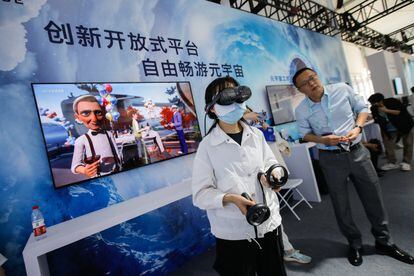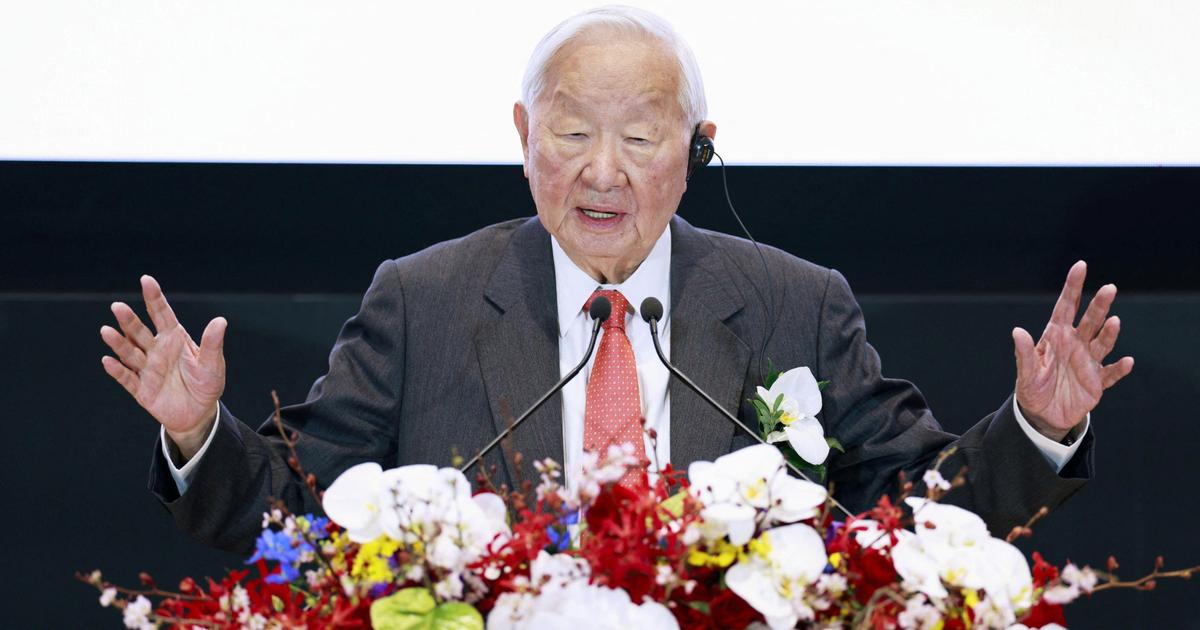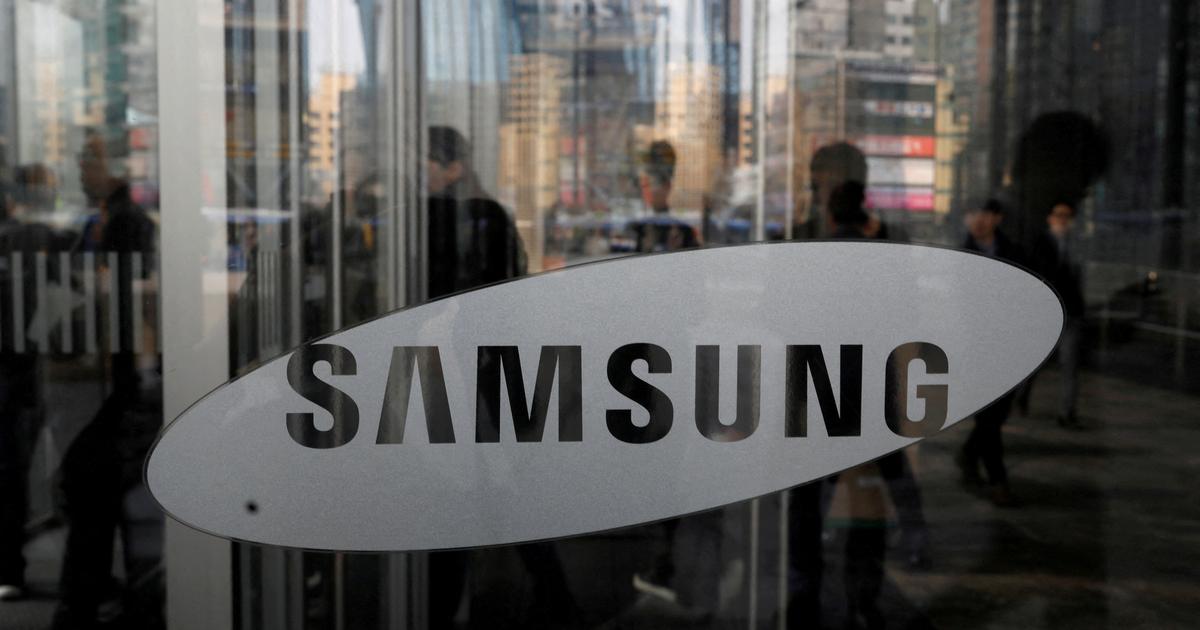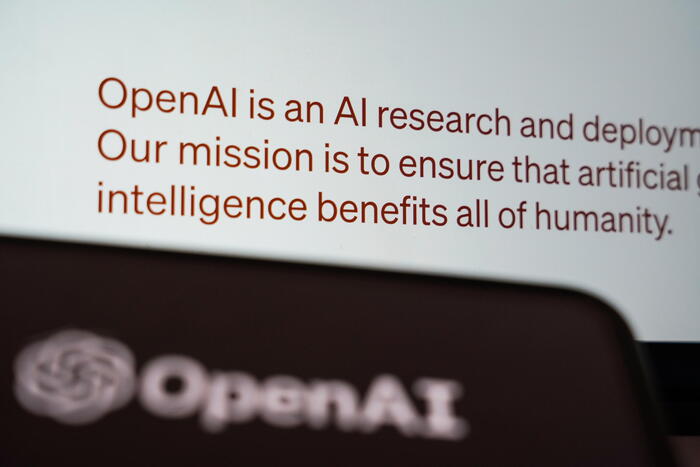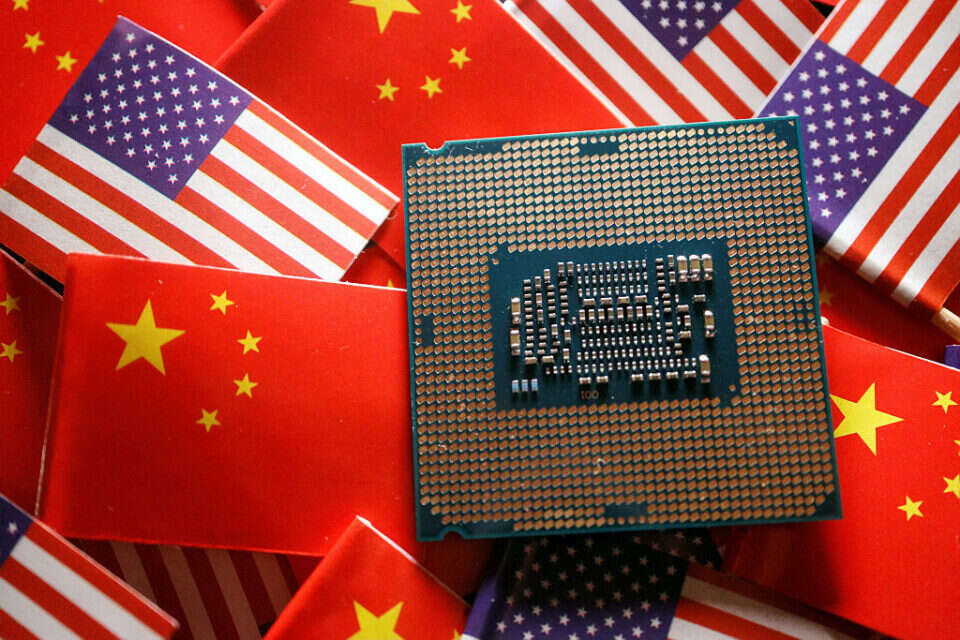A visitor wearing virtual reality glasses at the ZGC Forum in Beijing on Friday. WU HAO (EFE)
China does not want to be left behind in the domain of artificial intelligence and the critical sector of semiconductor chips, two of the key legs of the global technological race and one of the sources of geopolitical tension with the United States. Aware that the economic and military strength of the future gravitate to a large extent on these two fields, Beijing seeks to redouble its commitment to the development of national solutions at a time when Washington tries to limit access to cutting-edge technology that allows the Asian giant to produce high-end microchips. With millionaire investments and clear guidelines from the country's president, Xi Jinping, to achieve "self-sufficiency" in science and technology, for China the road passes in part through the implementation of open ecosystems that promote development at a greater speed and manage to accelerate the pace at which the distance with the West is shortened.
"Compared to developed countries, there is still a gap" in different elements that allow the development of AI, acknowledged Mei Jianping, from the Department of High Technology of the Ministry of Science and Technology, during a presentation dedicated to this matter at the Zhongguancun technology forum on Friday. In the macro event, organized these days in the homonymous technological district located on the outskirts of Beijing, Artificial Intelligence is one of the central issues. Speaker Mei encouraged "exchanging ideas" and for all actors to contribute to placing "China's new generation of AI" and the country's scientific and technological industry on a par with the rest of the world.
The event has a strong political background, so it involves what is going on there, but often the conferencesdescend to a technical level only suitable for experts in the sector. There are all kinds: on sustainable development, on financial technology, on smart cities, also on the search for young entrepreneurs "who change the world" and on the relevance of innovation in state-owned enterprises. On AI, for example, Dr. Yu Yue, from the Strategic Alliance for Technological Innovation in China's Artificial Intelligence Industry, says: "We want every computing center to achieve high-quality development. And also, horizontally, we want to connect the data centers to carry out broad collaboration and build a network that ensures that AI computing can adopt a new development model." He talks about an integration at the national level to promote the technological leap.
For the opening of the forum, held during the previous day, President Xi sent a letter in which he did not go into so much detail, but in which he did underline – without expressly mentioning the blockade imposed by the United States – the need for greater collaboration at the global level. "As a new round of scientific and technological revolution and industrial transformation unfolds, humanity needs international cooperation, openness and exchange more than ever to address common development problems," he said in the letter, according to the official Xinhua news agency. The inauguration had some renowned figures, such as Bill Gates, co-founder of Microsoft and co-president of the Bill & Melinda Gates Foundation, who intervened telematically. "China will be able to make unique contributions by sharing its technologies and lessons," Gates said, according to Chinese state media.
The background of the forum is marked by relations between Beijing and Washington, which are in a deep hole due to repeated scuffles around Taiwan, to which was added in February the downing by Washington of an alleged Chinese spy balloon that flew over US territory without permission. These last weeks have also seen signs of "thaw", a word that the US president came to pronounce after the G-7 summit in Hiroshima (Japan) last weekend.
Another symptom of this détente has been the "frank" meeting (according to the US Government) held this Thursday in Washington between the Minister of Commerce of China, Wang Wentao, and his US counterpart, Gina Raimondo, in which they have also spoken of the blows in the chip sector: Beijing has spoiled Washington its "economic and trade policies, and semiconductors, as well as export control issues," according to Xinhua; Raimondo has expressed concern about China's growing encirclement of U.S. interests based in China, such as the recent ban on semiconductors by the U.S. company Micron in key infrastructure projects.
This latest move by Beijing is interpreted in part as a reaction to the blockade that Washington imposed in October on the export to China of the technologies that allow the manufacture of the most advanced chips, with the intention of preventing the Chinese development of the most sophisticated weapons. These microprocessors are also needed in the field of AI and in the development of cutting-edge technologies, such as intelligent electric vehicles. In the entanglement, in addition, Taiwan plays a leading role, where about 60% of the world's chips and 90% of the most cutting-edge are produced (there are already developing those of three nanometers; while, China still lags behind). In a rare remark, Xi in March accused the United States of leading a Western strategy of "containment, encirclement and suppression" against China that seeks to jeopardize the country's development.
In the forum, in any case, there is confidence: "We will overcome this problem in the near future, we have already done it at other times in history," says Huo Jiaqi, 23, a graduate student who is in an exhibitor at the Beijing University of Posts and Telecommunications, one of the most prestigious in the fields of cable communications. wireless, computer science and electronic engineering. Around it, in a huge space dedicated to exhibiting technological advances, there is everything: intelligent humanoids, police robots, drones and avatars destined for the metaverse that sway on a LED screen.
Follow all the international information on Facebook and Twitter, or in our weekly newsletter.
75% discount
Subscribe to continue reading
Read without limits
Read more
I'm already a subscriber

